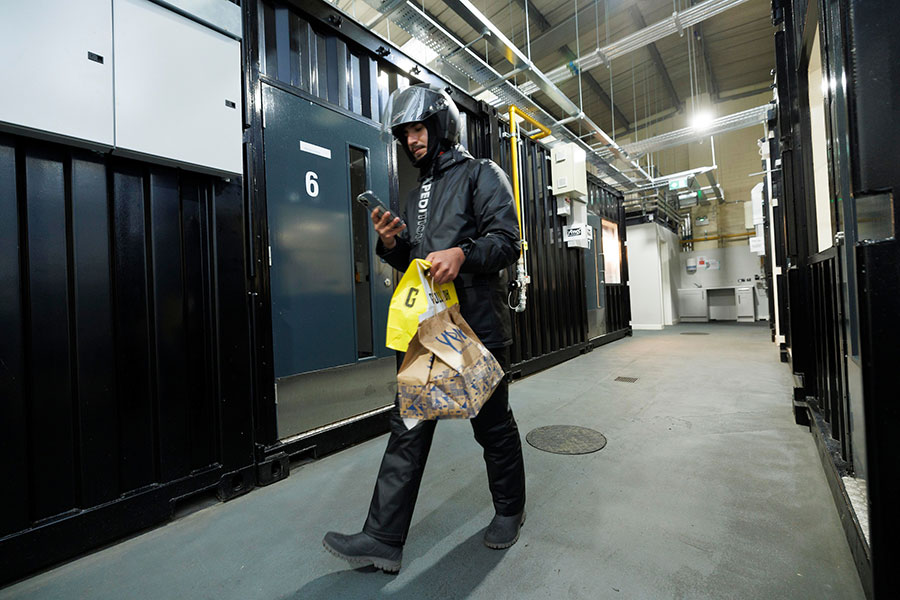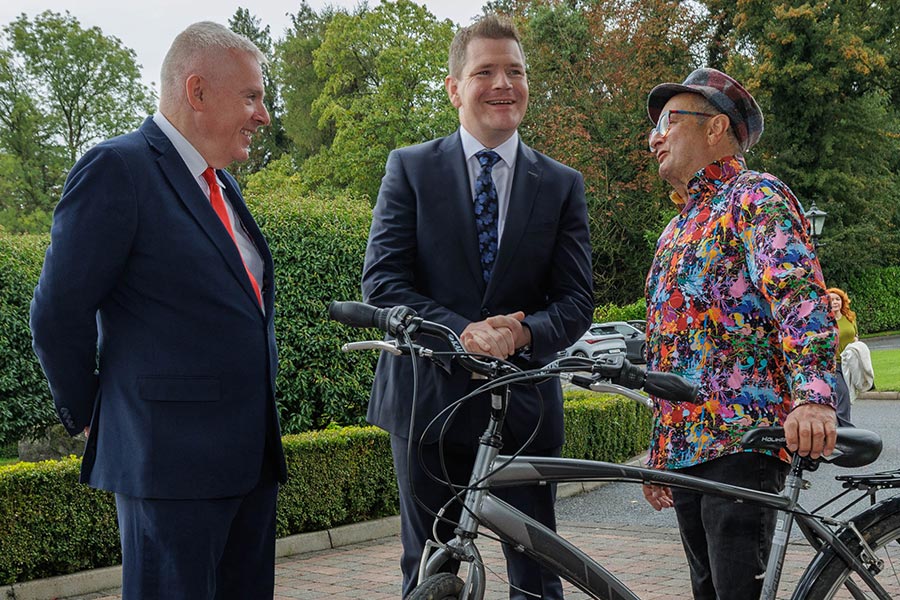Hosted Kitchens is an Irish foodtech company that’s tapping into the rise of ‘dark kitchens’, which provide all the facilities required by restaurants to expand their delivery business without the need for investment in brick-and-mortar outlets. Founder and chief executive Sean Murray tells George Morahan how it all works and outlines his vision for the company’s expansion
Ireland has punched above its weight in the foodtech sector, with restaurant ordering software firm Flipdish having attained unicorn status three years ago and buzzy drone delivery start-up Manna hoping to follow suit after raising another $30m in March.
Established during the pandemic in late 2020 amid surging demand for ‘dark kitchens’ (takeaway food preparation facilities that operate solely for the purpose of deliveries), Dublin-based Hosted Kitchens is another ambitious foodtech start-up intent on rapid expansion.
The company spent two and a half years and €1.5m to develop and fit out the 8,000 sq ft ‘digital kitchen hub’ it recently opened in Glasnevin in Dublin, with tenants including restaurants Sprezzatura, Griolladh, Yeeros and Shake Dog.
It also recently added All Bar Chicken to its roster.
Hosted Kitchen provides occupants with software that integrates into delivery services such as Just Eat, Deliveroo, Uber Eats and Manna, and the status of orders displays on screens in each kitchen.
There are also separate areas for delivery drivers to wait and for customers to retrieve click-and-collect orders.
Sean Murray, its chief executive and founder, says a further three large, customised units are currently under construction, to be filled by “enterprise brands, US-based chains” in the coming months.
Hosted Kitchens’ pitch to restaurants, which have been struggling following the introduction of several statutory employer costs such as the restoration of the 13.5% Vat rate for hospitality, is that they can effectively open a new location at a fraction of the cost and tap into a market of 250,000 customers on Dublin’s northside who are within the facility’s delivery radius.
Murray says the upfront cost to tenants is around €30,000 to €50,000, as opposed to the €400,000 to €750,000 to establish a new high street location.
“We provide all of the infrastructure required, so that a restaurant can just come to site, and all they have to do is bring their equipment and they’re ready to start cooking,” he explains.
“A huge amount of work goes in before that, particularly on the utility side, so we need to make sure that we have the equivalent electrical and gas capacity of a small shopping centre because we’re running 10-plus restaurants under one roof, and there’s a huge cost to that.
“We’ve got state-of-the-art infrastructure, and the design of the building is specific to our use case, so our whole model is to allow restaurants to expand into new areas for a fraction of the cost of a traditional bricks-andmortar fit-out.
“We take a lot of that cost up front on behalf of the restaurants.”
The concept has taken off in the US and the UK, where there are thousands of similar facilities.
Murray says there are 900 in London alone, and he visited many in the US prior to establishing Hosted Kitchens.
He saw how industrial units formerly occupied by garages, plumbers and fireplace sales warehouses had been repurposed as “urban logistics centres” — with “full Burger King operations in 150 sq ft kitchens” — and how it was happening rapidly, at scale.
“It blew my mind that these big enterprise global brands were now seeing the need to use these types of facilities to get their orders to customers as quickly as they could,” Murray says.
The landscape has changed dramatically since 2019, when the infrastructure for digital ordering in Ireland “just wasn’t there”.
Burger King and McDonald’s now generate 20-25% of their revenue from deliveries, up from less than 5% pre-Covid.
“Digital ordering had crept up on traditional restaurant businesses, and you can see that playing out now within the facility we have built, but also in the refurbishment of McDonald’s.
“McDonald’s are now building rooms within their restaurants specifically for delivery drivers to collect orders, so they’re not using the same space as customers,” Murray says.
“It is something that’s been coming down the tracks for quite a while, and we’ve opened this facility at a really exciting time in terms of what’s happening with food delivery in Ireland.”
Hosted Kitchens intends to open multiple sites in Dublin, Cork, Limerick and Galway.
Once the Glasnevin site is at full capacity, the company will “pull the trigger on sites two, three and beyond”.
He adds: “These sites can, depending on complications in development, take anything from nine months to two years to actually become operational, so it will be 2026 before the next big site opens.”
He confirms that Hosted Kitchens’ next facility will be located on the southside of Dublin and says the company is looking to open “in the region of 10-15 sites” over the next five years.
“That’s the rough timeline on getting the kind of coverage we feel the country can facilitate.”
Murray worked at Microsoft, Google and Allcare Pharmacy as digital project lead prior to starting his first company, WeBringg, in 2015.
It offered a network of last-mile, same-day delivery riders, but later shifted focus to its software, which was used by businesses like Burger King and Just Eat to manage and track orders as well as their own driver fleets.
WeBringg rebranded first as WeDispatch and then VROMO.
Murray stepped away in 2021 to focus on Hosted Kitchens.
The company was acquired last year by Inspire Brands, owner of Dunkin’ and Buffalo Wild Wings.
Why has Murray remained in the foodtech space, then? A love of food for starters, but it’s also an area that has been in “growth mode” for over a decade and is set to “grow further for another decade”, he says.
Murray has been encouraged by the trajectory of Just Eat and Deliveroo over the past two years, believing they offer a barometer of how the wider food delivery industry is doing.
He expects annual sectoral growth of 5-8% per year in Ireland and the UK for the next five years.
“But then, it’s also just great working with all these different food entrepreneurs and getting the odd free bag of chips along the way,” he says.
To date, Hosted Kitchens has raised a total of €3.5m, including €2.2m in a 2023 funding round.
The company has no plans to fundraise externally again, and certainly not in the next 12 months.
Its latest available accounts show the firm had net assets of €1.1m at the end of 2023, up from €8,333 in 2022.
Looking ahead, Murray plans to try direct traffic through the building more efficiently to improve food quality, reviews and sales.
He’s excited by Hosted Kitchens’ partnership with Manna, for the potential to “take the human out of the equation” and complete deliveries in a tenth of the time.
Until that time, the industry will remain reliant on delivery drivers.
They typically operate as independent contractors, and thus don’t avail of the same protections as employees, which Murray is ambivalent about.
“At a minimum, we try to treat the drivers well, so we let them use the toilet facilities. We have areas for them to safely park their vehicles, whatever they might be.

“We have areas for them to charge their phones and areas for them to wait,” he says.
“I think they should be given the option [of employment over self-employment]. Some like the self-employment model and want to be able to work for multiple companies at the same time, work when they want, where they want, and obviously, there are pros and cons to that.
“Some of them will want to be an employed driver and have a set amount of hours and know exactly where they’re working and who they’re working for. I think that should be a choice.”
Photo: Sean Murray Hosted Kitchen. Picture Conor McCabe Photography.










